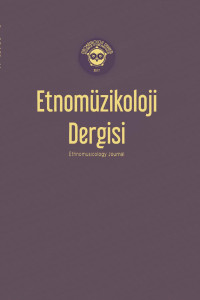Öz
The purpose of this paper is to present the local musical tradition of the villages of Drama, which are part of the general Greek rural folk musical tradition. Drama is a geographical region of Eastern Macedonia in Northeastern Greece, consisting of a main town, Drama, and many surrounding villages. The villages of Drama are known for their unique local musical tradition, which varies from village to village. In these villages we find an accompaniment, called “zygiá” in Greek, made up of two musical instruments, a combination of the lýra, gkáinta and ntaharé. In particular, this paper deals with the villages of Xiropótamos, Monastiráki, Pírgi, Kalí Vrísi, Micrópoli, Pagonéri, Vólakas, but concentrates on the case of the village of Petroússa. It aims to describe the local musical tradition of Petroússa more precisely (i.e. which folk instruments are played, what are the main songs and instrumental pieces, what are the prominent rhythmic structures?). This study also gives a general idea of when and how local folk music is performed in Petroússa and who were and are its main bearers. More importantly, this paper comments on the musicological characteristics of the Drama folk musical tradition, providing examples, and exploring the social factors that have influenced it.
Anahtar Kelimeler
Greece Drama Petroússa Greek folk musical tradition Greek local musical traditions lýra ntaharé gkáinta
Teşekkür
Special thanks to the third generation of musicians from Petroússa and in particular to Nikólaos and Ángelos Zedamánis, for their musical performances, the many talks on topics related to the local musical tradition, and their general collaboration, which made the writing of this paper and the musical seminar in Athens possible. We would also like to thank the chairman of the Cultural Association of Petroússa, Konstantínos Pournárkas, for his general support for anything cultural that we might propose for Petroússa. Special thanks to Photini Downie Robinson for the English proofreading of the paper.
Kaynakça
- Amargianákis, Geórgios (1994). Εισαγωγή στην ελληνική δημοτική μουσική. Σημειώσεις του Τμήματος Μουσικών Σπουδών του Εθνικού και Καποδιστριακού Πανεπιστημίου Αθηνών [=Introduction to Greek Folk Music. Notes for the Department of Music Studies of the National and Kapodistrian University of Athens]. Athens.
- Anogianákis, Fívos (1991). Ελληνικά λαϊκά μουσικά όργανα [=Greek Folk Musical Instruments]. Athens: Melissa Publishers.
- Chaldæáki, Evangelía (2024). Σύγχρονες μουσικολαογραφικές παρατηρήσεις από το δρώμενο «Μπάμπιντεν» της Πετρούσσας Δράμας [=Contemporary mMusic and Folklore Observations on the “Bábiden” Event of Petroússa in Drama]. «Σύγχρονη Ελληνική Λαογραφία: Έρευνα και Εκπαίδευση», Δ΄ Πανελλήνιο Συνέδριο των Πανεπιστημιακών Λαογράφων και Ερευνητών. Κομοτηνή, 1-3 Νοεμβρίου 2024 [=”Contemporary Greek Folklore: Research and Education”, 4th Panhellenic Congress of the Academic Folklorists and Researchers. Komotini, November 1-3, 2024].
Öz
Bu makalenin amacı, genel Yunan kırsal halk müzik geleneğinin bir parçası olan Drama köylerinin yerel müzik geleneğini sunmaktır. Drama, Kuzeydoğu Yunanistan'da Doğu Makedonya'ya bağlı bir coğrafi bölgedir ve Drama adlı bir ana kent ile çevresindeki birçok köyden oluşur. Drama köyleri, köyden köye değişen benzersiz yerel müzik gelenekleriyle tanınır. Bu köylerde, Yunanca'da “zygiá” olarak adlandırılan ve lýra, gkáinta ve ntaharé'nin birleşiminden oluşan iki müzik aletinden oluşan bir eşlik buluruz. Bu makale özellikle Xiropótamos, Monastiráki, Pírgi, Kalí Vrísi, Micrópoli, Pagonéri, Vólakas köylerini ele almakta, ancak Petroússa köyü örneğine odaklanmaktadır. Petroússa'nın yerel müzik geleneğini daha kesin bir şekilde tanımlamayı amaçlamaktadır (yani hangi halk enstrümanları çalınmaktadır, ana şarkılar ve enstrümantal parçalar nelerdir, öne çıkan ritmik yapılar nelerdir?) Bu çalışma aynı zamanda Petroússa'da yerel halk müziğinin ne zaman ve nasıl icra edildiğine ve ana taşıyıcılarının kimler olduğuna dair genel bir fikir vermektedir. Daha da önemlisi, bu makale Drama halk müziği geleneğinin müzikolojik özelliklerini yorumlamakta, örnekler sunmakta ve onu etkileyen sosyal faktörleri araştırmaktadır.
Anahtar Kelimeler
Yunanistan Drama Petroússa Yunan halk müziği geleneği Yunan yerel müzik gelenekleri lýra ntaharé gkáinta
Kaynakça
- Amargianákis, Geórgios (1994). Εισαγωγή στην ελληνική δημοτική μουσική. Σημειώσεις του Τμήματος Μουσικών Σπουδών του Εθνικού και Καποδιστριακού Πανεπιστημίου Αθηνών [=Introduction to Greek Folk Music. Notes for the Department of Music Studies of the National and Kapodistrian University of Athens]. Athens.
- Anogianákis, Fívos (1991). Ελληνικά λαϊκά μουσικά όργανα [=Greek Folk Musical Instruments]. Athens: Melissa Publishers.
- Chaldæáki, Evangelía (2024). Σύγχρονες μουσικολαογραφικές παρατηρήσεις από το δρώμενο «Μπάμπιντεν» της Πετρούσσας Δράμας [=Contemporary mMusic and Folklore Observations on the “Bábiden” Event of Petroússa in Drama]. «Σύγχρονη Ελληνική Λαογραφία: Έρευνα και Εκπαίδευση», Δ΄ Πανελλήνιο Συνέδριο των Πανεπιστημιακών Λαογράφων και Ερευνητών. Κομοτηνή, 1-3 Νοεμβρίου 2024 [=”Contemporary Greek Folklore: Research and Education”, 4th Panhellenic Congress of the Academic Folklorists and Researchers. Komotini, November 1-3, 2024].
Ayrıntılar
| Birincil Dil | İngilizce |
|---|---|
| Konular | Müzikoloji ve Etnomüzikoloji |
| Bölüm | Araştırma Makaleleri |
| Yazarlar | |
| Yayımlanma Tarihi | 30 Kasım 2024 |
| Gönderilme Tarihi | 7 Kasım 2024 |
| Kabul Tarihi | 21 Kasım 2024 |
| Yayımlandığı Sayı | Yıl 2024 Cilt: 7 Sayı: 2 |


